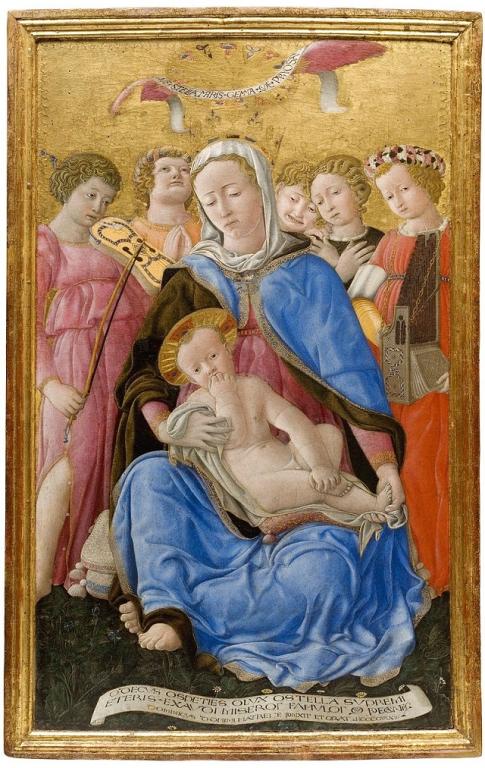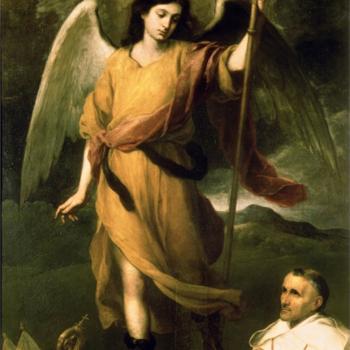. . . Luther, Calvin, Zwingli, and Bullinger
(10-10-08)
* * * * *
Can you or someone on this forum [Coming Home Network] explain what heresy it was that the bishops were combating in proclaiming this doctrine?
Nestorianism. For a description of that heresy, see the use of Theotokos in the Church fathers.
Most Protestants believe that Mary was the mother of Jesus but not the mother of God. That term would never be uttered in an Evangelical Protestant service because it would be considered false.
They obviously don’t know what it means, and completely misunderstand its intention.
I’ve heard it said during a Sunday school lesson that Mary was just an incubator, and no one stepped up to the plate to challenge such a comment. Even at Christmas time when Mary is mentioned, she is referred to only as the mother of Jesus. And this problem stems from the idea of Sola Scriptura, because Protestants will ask, “Where does it say in the Bible that Mary is the mother of God?” They will dismiss the ecumenical council that proclaimed this as doctrine because they can’t find the term in the written word.
Theotokos isn’t in Scripture, to my knowledge, but it is almost a moot point, because Scripture teaches that:
1) Jesus is God (many many biblical proofs).
2) Mary is His true mother (Is 7:14; Matt 1:16,18; 2:11,13,20; 12:46; Lk 1:31,35,43; Jn 1:15; 2:1; Gal 4:4).
Ergo, “Mary is the Mother of God” [the Son].
James Cardinal Gibbons explains the doctrine of Theotokos very well:
We affirm that the Second Person of the Blessed Trinity, the Word of God, who in His divine nature is from all eternity begotten of the Father, consubstantial with Him, was in the fullness of time again begotten, by being born of the Virgin, thus taking to Himself, from her maternal womb, a human nature of the same substance with hers.
But it may be said the Blessed Virgin is not the Mother of the Divinity. She had not, and she could not have, any part in the generation of the Word of God, for that generation is eternal; her maternity is temporal. He is her Creator; she is His creature. Style her, if you will, the Mother of the man Jesus or even of the human nature of the Son of God, but not the Mother of God.
I shall answer this objection by putting a question. Did the mother who bore us have any part in the production of our soul? Was not this nobler part of our being the work of God alone? And yet who would for a moment dream of saying “the mother of my body,” and not “my mother?” . . . . .
In like manner, . . . the Blessed Virgin, under the overshadowing of the Holy Ghost, by communicating to the Second Person of the Adorable Trinity, as mothers do, a true human nature of the same substance with her own, is thereby really and truly His Mother.
It is in this sense that the title Mother of God, denied by Nestorius, was vindicated to her by the General Council of Ephesus, in 431; in this sense, and in no other, has the Church called her by that title.
Hence, by immediate and necessary consequence, follow her surpassing dignity and excellence.
(The Faith of Our Fathers, New York: P. J. Kenedy & Sons, revised edition, 1917, 137-138)
That would seem straightforward enough, but anti-Marianism runs strong in Protestant circles, in reaction to what they perceive as an “excessive Mariology” in the Catholic Church. So they become downright irrational in their opposition to “Mother of God.” This opposition, however, is not intrinsic to Protestantism, since early Protestant leaders Luther, Calvin, Zwingli, and Bullinger all used the term “Mother of God” (or at least described the same concept in slightly different terms):
Martin Luther
A new lie about me is being circulated. I am supposed to have preached and written that Mary, the mother of God, was not a virgin either before or after the birth of Christ, but that she conceived Christ through Joseph, and had more children after that.
(That Jesus Christ Was Born a Jew, 1523, Luther’s Works [LW], Vol. 45, 199)
She became the Mother of God, in which work so many and such great good things are bestowed on her as pass man’s understanding. For on this there follows all honor, all blessedness, and her unique place in the whole of mankind, among which she has no equal, namely, that she had a child by the Father in heaven, and such a Child . . . Hence men have crowded all her glory into a single word, calling her the Mother of God . . . None can say of her nor announce to her greater things, even though he had as many tongues as the earth possesses flowers and blades of grass: the sky, stars; and the sea, grains of sand. It needs to be pondered in the heart what it means to be the Mother of God.
(Commentary on the Magnificat, 1521; LW, Vol. XXI, 326)
I would venture to wager my neck that none of those very liars who allege such great things in honor of the mother of God believes in his heart a single one of these articles.
(That Jesus Christ Was Born a Jew, 1523, LW, Vol. 45, 199)
[S]he is rightly called not only the mother of the man, but also the Mother of God. . . . it is certain that Mary is the Mother of the real and true God.
(Sermon on John 14:16, 1539, LW, Vol. XXIV, 107)
We, too, know very well that Christ did not derive his deity from Mary; but it does not follow that it must, therefore, be false to say, “God was born of Mary” and “God is Mary’s Son” and “Mary is God’s mother.”
(On the Councils and the Church, 1539; Works of Martin Luther [PE], edited and translated by C.M. Jacobs and A. T. W. Steinhaeuser et al; Philadelphia: A.J. Holman Co. and the Castle Press, 1930, six volumes; also reprinted by Baker Book House, Grand Rapids, Michigan, 1982; Vol. V, 218)
He [Nestorius] admits that Christ is God and man in one Person; but since His deity does not come from His mother, Mary, she ought not to be called the mother of God. This was rightly condemned in the council, and ought to be condemned.
(Ibid., PE, Vol. V, 219)
Mary is the true, natural mother of the child called Jesus Christ, and the true mother and bearer of God . . . Mary suckled God, rocked God, made broth and soup for God. For God and man are one Person, one Christ, one Son, one Jesus, not two persons . . . just as your son is not two sons . . . even though he has two natures, body and soul, — body from you, soul from God alone.
(Ibid., PE, Vol. V, 220)
Luther wasn’t the only early Protestant who used the term. Huldreich Zwingli had printed in 1524 a sermon on “Mary, ever virgin, mother of God.”
I have never thought, still less taught, or declared publicly, anything concerning the subject of the ever Virgin Mary, Mother of our salvation, which could be considered dishonourable, impious, unworthy or evil . . . I believe with all my heart according to the word of holy gospel that this pure virgin bore for us the Son of God and that she remained, in the birth and after it, a pure and unsullied virgin, for eternity.
(from: Max Thurian, Mary: Mother of all Christians, translated by Neville B. Cryer, New York: Herder & Herder, 1963, 76 / primary source: Zwingli Opera, Corpus Reformatorum, Berlin, 1905, v. 1, p. 424)
Heinrich Bullinger, Zwingli’s successor in Zurich, agreed:
The Virgin Mary . . . completely sanctified by the grace and blood of her only Son and abundantly endowed by the gift of the Holy Spirit and preferred to all . . . now lives happily with Christ in heaven and is called and remains ever-Virgin and Mother of God.
(from: Hilda Graef, Mary: A History of Doctrine and Devotion, combined edition of volumes 1 and 2, London: Sheed & Ward, 1965, vol. 2: 14-15)
Even John Calvin concurred:
It cannot even be denied that God conferred the highest honour on Mary, by choosing and appointing her to be the Mother of his Son.
(from: Harmony of the Synoptic Gospels, comment under Luke 11:27; primary source: Calvini Opera, Corpus Reformatorum, Braunschweig-Berlin, 1863-1900, v. 45, p. 348, 35)
She [Elizabeth] calls Mary the mother of her Lord This denotes a unity of person in the two natures of Christ; as if she had said, that he who was begotten a mortal man in the womb of Mary is, at the same time, the eternal God. For we must bear in mind, that she does not speak like an ordinary woman at her own suggestion, but merely utters what was dictated by the Holy Spirit. This name Lord strictly belongs to the Son of God “manifested in the flesh,” (1 Timothy 3:16,) who has received from the Father all power, and has been appointed the highest ruler of heaven and earth, that by his agency God may govern all things. Still, he is in a peculiar manner the Lord of believers, who yield willingly and cheerfully to his authority; for it is only of “his body” that he is “the head,” (Ephesians 1:22, 23.) And so Paul says, “though there be lords many, yet to us,” that is, to the servants of faith, “there is one Lord,” (1 Corinthians 8:5, 6.) By mentioning the sudden movement of the babe which she carried in her womb, (ver. 44,) as heightening that divine favor of which she is speaking, she unquestionably intended to affirm that she felt something supernatural and divine.
(Harmony of the Synoptic Gospels, comment under Luke 1:43; Calvini Opera, ibid., vol. 45, 35)
Moreover, The Formula of Concord (1577), binding on Lutherans, states:
Hence we believe, teach, and confess that Mary conceived and bore not a mere man and no more, but the true Son of God; therefore she also is rightly called and truly is the mother of God.
(Epitome, Article VIII: The Person of Christ, section 7)
On account of this personal union and communion of the natures, Mary, the most blessed Virgin, bore not a mere man, but, as the angel [Gabriel] testifies, such a man as is truly the Son of the most high God, who showed His divine majesty even in His mother’s womb, inasmuch as He was born of a virgin, with her virginity inviolate. Therefore she is truly the mother of God, and nevertheless remained a virgin.
(Solid Declaration, Article VIII: The Person of Christ, section 24; see also Catalog of Testimonies, section 8)
“Evangelicals and the Mother of God” (First Things, February 2007), by Baptist Timothy George.














